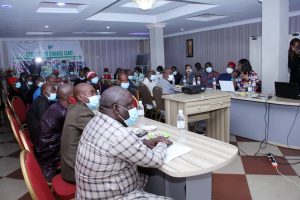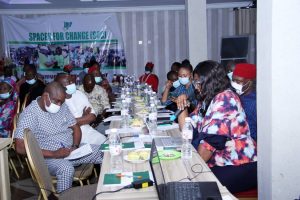Forty-five (45) stakeholders in the extractive sector converged at the one-day validation meeting held in Owerri, Imo State capital, to validate the preliminary findings of an ongoing research evaluating the effectiveness of the benefit-sharing and community engagement practices pertaining to the Assa North and Ohaji South (ANOH) Gas Development Project located in Ohaji/Egbema Local Government Area of Imo State. Organized by Spaces for Change | S4C with support from Ford Foundation, the event afforded stakeholders—comprising federal, state and local government officials, representatives of oil and gas host communities in Ohaji/Egbema LGA, civil society organizations, and the media—the opportunity to deliberate on and make inputs into the draft research report, “An Independent Evaluation of the Benefit-Sharing and Community Engagement Mechanisms under the Assa North and Ohaji South (ANOH) Gas Development Project”.
Beginning from September 2020, SPACES FOR CHANGE has been independently evaluating the ANOH gas development project designed to process future wet gas from the upstream unitized gas fields at OML 53 & OML 21. The project is one of the largest greenfield gas condensate development projects out of the seven critical gas projects (7CGDP) in Nigeria with the expectation that future gas production from the project will supply the domestic and international markets. Using the human rights paradigm (of equality, negotiation, participation, gender inclusion, information disclosure and international oil field best practices) as benchmarks for the evaluation, S4C assessed the benefit-sharing and stakeholder engagement practices applied in the conceptual, planning and implementation phases of the ANOH project. With a view towards pushing the boundaries of good practice, this research captures ongoing challenges particularly pertaining to the negotiation of costs and benefits between extractive companies and their host communities, so that they can be better managed to prevent the escalation of conflict.
S4C’s director, Victoria Ibezim-Ohaeri presented the research report, detailing the objectives, methodology, benefits, and eight key results of the study. Of specific significance are the heightened due-process concerns regarding the handling of important issues around land, resettlement, compensation, livelihoods and the modalities for the negotiation of benefits of natural resources between local communities and extractive companies. Fears about imminent loss of farmlands and displacement from their ancestral lands are widespread, fueling anger and resistance. Other gaps flagged include inadequate information disclosure protocols, government’s weak regulatory and enforcement mechanisms for environmental compliance, lopsided power relations between locals and corporations., and the maintenance of the safety and security of extractive operations within a framework that ensures respect for human rights.
In terms of the outcomes of the community engagement practices and benefit-sharing agreements between extractive companies and the ANOH project host communities, the report found evidence of tensions caused by the divide-and-rule tactics of operators as was evident in the establishment of parallel mechanisms of community engagement, polarizing communities, deflating community bonds and fueling restiveness in communities; extractive companies unilaterally drafting the GMOUs encoding community benefits with minimal local participation, resulting in unfair contractual terms and power imbalances at the negotiation table; poor implementation and monitoring of GMOUs performance; exclusion of community priorities in benefit-sharing agreements; low-compliance with extant laws and the near absence of gender balance in existing community engagement mechanisms. Finally, the report established a finding of huge contrasts between the reported payouts to communities and the realities on ground.
Reacting to the revelations detailed in the study’s preliminary findings, Honourable Henry Nwawuba representing Mbaitoli/Ikeduru Federal Constituency and also the Chairman, House of Representatives Committee on Niger Delta, expressed concerns about the continuing denials and deprivations of host communities from the benefits of resource extraction. He disclosed that the 9th National Assembly is expediting action to secure the passage of the Petroleum Industry Bill (PIB) 2020, a bill which not only aims to entrench accountability in the administration of the petroleum resources of Nigeria, but also seeks to foster sustainable prosperity within host communities and provide direct social and economic benefits from petroleum operations to host communities. It is hoped that the passage would enhance peaceful and harmonious co-existence between licensees or lessees and host communities, and create a framework to support the development of host communities.
In his presentation, the Executive Chairman, Ohaji/Egbema LGA, shared numerous experiences of he resisted the divide-and-rule tactics during his engagements with extractive companies long before he became the Chairman. He thanked S4C for the eye-opening research, which will inform a community-wide campaign for attitudinal change in future negotiations. He promised that his office will work with S4C to continue the advocacy for the demand of fair and equitable benefits from extractive companies.
State government officials from Imo State Oil Producing Area Development Commission (ISOPADEC), ministries of gender and women empowerment, traditional rulers, presidents general and community representatives took turns to validate research findings using their personal, community and inter-ministerial experiences. Most of the commentary focused on the lack of knowledge about the nature, scope, licensing terms, land acquisition, compensation regimes applicable to the ANOH project coupled with the lack of access to expert legal advice during the negotiation and signing of the global memorandum of understanding. These have denied them the power to demand fair and equitable resource benefits from extractive companies operating in their domains. SPACES FOR CHANGE is the only organization rendering sound legal advice to host communities and building local negotiation capacities free of charge at the moment. They therefore appealed to S4C to continue the advocacy for environmental and social justice for communities hosting major extractive projects and conduct more townhalls meeting with them to educate and empower them in their demand for fair and equitable sharing of benefits.
Civil Society Organizations (CSOs) present advocated for the extension of the research presentation exercise to all oil producing communities across the state and in the Niger Delta region through sustained advocacy, townhall meetings, and empowerment workshops because the issues raised in the report transcends Ohaji\Egbema LGA. In his closing remarks, S4C’s Program Officer, Nosayame Osahon admonished that for communities to get their due from natural resources, all hands must be on deck to push forward the advocacy for transparency and accountability of extractive operations. The violence resulting from oil exploration in the Delta may be used as an example in other contexts to convince operators of the ANOH project that equitable benefit-sharing, good environmental practice and quality community remediation is within their best interest. When finalized, S4C’s research will serve as the bases for a robust campaign for the review of the governments’ and oil and gas operators’ policy interventions and community engagement practices with focus on adequate sharing of natural resource benefits.





